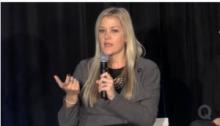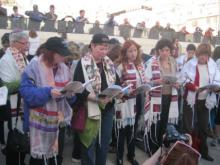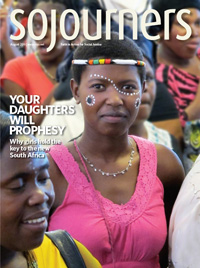girls
AS I ATTENDED seminary in my native Chicago, I heard about one senseless death after another. A six-month-old baby shot multiple times with an assault weapon; a young black girl, with promise and a future, caught in the crossfire—all casualties of gang violence.
This violence is further evidence to me that our theology is needed on the streets. A theology that can impact the crisis facing the black community must be relevant to the black community. Theology can never be disengaged from the history of black people, the “isms” that have oppressed us, and the struggles that have birthed our progress. “Relevancy,” for theology, means moving beyond the academy and the church and into the streets, where it becomes our thinking faith in action.
Does our theology have anything to say to African-American gang girls? The formation of girl gangs is rooted in the numerous social ills affecting many urban African-American communities. By taking our theology to the streets, we can offer African-American gang girls an alternative hope and future. Four theological frameworks can aid in that task.
First, a practical theology—thinking faith in action—that models Jesus’ ministry to the marginalized can reach these girls with the message of God’s compassion, peace, and hope by offering a positive relational sisterhood that can replace gang life.

Watching the news cycle for the past week or so, I have been pleasantly surprised at how much the issue of poverty is being discussed. There have been many analyses of the successes and failures of the War on Poverty, the 50th anniversary of which we marked last week. But there is one report that has particularly fascinated me — and many others — as it describes how women have been struggling the most against poverty in the United States. In partnership with the Center for American Progress, this year’s Shriver Report: A Woman’s Nation Pushes Back from the Brink examines the problem of poverty as it pertains to women and proposes solutions to eradicate it.
Although those of us who have lived and worked in low-income neighborhoods have witnessed firsthand how poverty affects women and their children, seeing the numbers laid out is still overwhelming.
Sojourners campaigns assistant Anna Hall posted a great piece last week de-bunking 5 myths about the minimum wage. One of these myths — that most minimum wage workers are suburban teenagers — was countered by the facts: nearly two-thirds of minimum wage workers are adult women.
Don’t think of a suburban teenager — think of a single mother working full time while trying to raise her children, care for her family, and make enough to pay rent, probably without any paid sick or personal days (not to mention maternity leave). Could you do that on $15,000 a year?
On Jan. 13, Maria Shriver – who, in addition to her many accomplishments, is the daughter of the statesman widely regarded as the architect of the “War on Poverty” — released a report focusing on the needs of women in the current economy.

Today churches are often rocked with sexual harassment and abuse perpetrated by priests and clergy. Yet, sexual harassment and abuse to clergy, specifically clergywomen, is often swept under the rug.
A 2007 study by the United Methodist Church on sexual harassment and abuse found that nearly 75 percent of Methodist clergy women have experienced sexual harassment and abuse. The common settings for such harassment are church meetings and offices where perpetrators are mostly men and increasingly laity. “Sexual harassment destroys community. This alienating sinful behavior causes brokenness in relationships,” the study states.
Despite the prevalence of increased boundary training and education, the 2007 study found that only 34 percent of small churches and 86 percent of large churches have policies to handle such situations.
In 30 years of ministry, diaconal and ordained, I have seen that church politics, ignorance of or lack of policies and procedures, tolerance for inappropriate behavior, status of perpetrator, and money are obstacles to dealing with sexual harassment and abuse to clergy in a healthy way.
There was a lot to celebrate this year for women in the media. But some things aren't changing fast enough. Check out an overview of how the media treated women this year below courtesy of the folks over at Miss Representation.

Christian women are a hot topic these days.
Over the past year, more and more Christian women have spoken out about what it means to be a woman in the public square. From the debate over Rachel Held Evans’ A Year of Biblical Womanhood and whether the Bible prescribes specific roles for women to the fascinating discussions about spirituality and sexuality in Talking Taboo: American Christian Women Get Frank About Faith, women of faith are wrestling with how to transcend sexism and patriarchy to cultivate their God-given gifts in the pulpit, at home, and in their daily lives.
To further this conversation, the good people at Q Ideas recently sponsored a Women & Calling event. In Christian TED talk fashion, 12 phenomenal speakers shared their thoughts on what it means for women to live in response to God’s call, to discern their vocations, to navigate the tension between family and work, to embrace their fears and ambitions, and to follow after God with abundant hope.
Unlike other Christian conferences where female representation remains the exception and not the norm, Q flipped the script by featuring the voices of 11 women and one man. Together, these 12 disciples described the fullness and joy of the kingdom of God when we are all empowered to live into our gifts.

A school assembly speaker is gaining national attention. In Richardson, Texas, a high school brought in “motivational speaker and dating expert” Justin Lookadoo to speak to the students about relationships and dating. Lookadoo traverses the country speaking to students about the ins and outs, the perils and pitfalls of dating. Lookadoo gives teens a definitive answer on their status in the realm of dating. His quiz parallels with his “Dateable Rules,” some of which are textbook gender stereotypes and Christian theological distortions.
To be honest, I think his “rules” are bogus. They come from a place where boys and girls are divided into classes and in the end boys win. Making girls out to be “damsels in distress” and boys are “heroic warriors looking for an adventure” doesn't equate a relationship.
Relationships are built upon respect and mutuality not antiquated thinking when it comes to gender roles.

When I was a Ph.D. candidate in Yale University’s New Testament program, I had the honor of preaching at an ordination service for a classmate who was being ordained as a Presbyterian minister. Following the service, a number of my classmates asked me why I wanted to spend four-seven years working on a Ph.D. in New Testament when I clearly had a "gift" for preaching. I responded that it was actually my academic study of the Bible coupled with my life experiences that illumined and enlivened my preaching.
I did not grow up reading the Bible. I was almost 19 years old and a U.S. Army soldier stationed in the Federal Republic of Germany when I purchased my first Bible. A series of life-changing events led to me "accepting Jesus Christ as my personal lord and savior." A few months after purchasing my first Bible, I attended a revival service at a local church. I returned to post that evening describing the service to fellow soldiers, who, along with myself, comprised a group self-identified as the "Soul Patrol." We were African-American Christians who strongly believed in the necessity of Christian evangelization.

As the proliferation of pink points to October as Breast Cancer Awareness Month, shades of purple warn us not to forget Domestic Violence Awareness. The story in the Gospel of Luke sheds light on what tenacity, in any form, can accomplish. The widow did not cease in her efforts. Someone had wronged her; and she wanted the situation to be made right. We must be equally diligent in our determination to obliterate domestic violence. We must not become comfortable with reporting abuse after the fact. Our judicial officials, police personnel, school counselors, religious institutions to name a few, must take even the slightest whisper of harm seriously. We must not succumb to the foolish reasoning that “snitching” will put more African American men in prison. If we keep talking, teaching, sharing, and behaving as good stewards of God’s creation, there is nothing or no one to prevent us from getting a handle on domestic violence — and not putting an abusive hand on each other.
Survivors of domestic violence cope in many ways. Some engage in substance abuse while others tend to “over-spiritualize” their experiences. My mother chose to commit suicide to deal with her pain. Today, Yvette Cade travels the country speaking about her life. She is on the mend physically, but she is still afraid. Nonetheless, through her fear, she lifts her voice. Not one more person should have be battered or bruised before someone dares to help. Before we dare to help.

JERUSALEM — In a stunning reversal, a feminist Jewish prayer group said it will consider a government proposal to allow a mixed-gender prayer space at the Western Wall — but only after the government agrees to their conditions.
For 25 years, Women of the Wall has demanded access to pray at the sacred site that is home to the remnants of the Jewish Temple and is overseen by the Orthodox religious establishment. The group objects to the restrictions placed on them when they pray in the women’s section. They want to continue to pray in that section but will consider a compromise.
After a “comprehensive and emotionally trying decision-making process,” the group’s executive board on Monday overwhelmingly decided “to create a future in which, under the right conditions,” its members will pray “in an equal and fully integrated third section of the Kotel,” the Hebrew word for the Western Wall.
Women of the Wall has demanded the right to pray directly from a Torah scroll, wearing prayer shawls and phylacteries — practices and rituals that strict Orthodox Judaism reserves for men.

The Internet is abuzz with Miss Utah. Marissa Powell was asked at Sunday night’s Miss USA Pageant:
“A recent report shows that in 40 percent of American families with children, women are the primary earners, yet they continue to earn less than men. What does that say about society?”
Powell responded: “I think we can relate this back to education, and how we are continuing to try to strive … to … figure out how to create jobs right now. That is the biggest problem right now. I think, especially the men are … um … seen as the leaders of this, and so we need to see how to … create education better. So that we can solve this problem. Thank you.”
Her answer was painfully incoherent, and as you can tell in the video, the poor girl knew it. There’s a bit of irony in the question that has been missed. Maybe we should be asking, “What does it say about our society that we still have these kinds of beauty pageants?”
WHEN MY DAUGHTER, Jessica, was 7 years old, some of her best friends had American Girl dolls, so of course she desperately needed one as well. We asked three or four family members to chip in—these were expensive dolls—and got her one for Christmas.
Her doll, “Addy,” came with a story, as did each in the American Girl line. Addy and her mother had escaped from slavery in the American South, and they “followed the drinking gourd” north to Philadelphia, where they were eventually reunited with the rest of Addy’s family. It was a gripping story, especially for a 7-year-old. And the fact that Addy was about my daughter’s age made it all the easier for her to connect.
“It wasn’t so much that I learned ‘facts’” about slavery and race from the Addy stories, Jessica, now 27, told me recently, “but they made it all more personal. Addy was young, like me—I could relate to it.”
Other women who grew up with the dolls echoed that sense of connection with the various American Girl stories. Janelle Tupper, campaigns assistant at Sojourners, was around 7 when she received the “Kirsten” doll, a Swedish immigrant to the U.S. “My most distinct memory from the stories was that, on the boat, her best friend dies of cholera,” Tupper said. “Reading that passage was pretty devastating to me as a kid.” Other books in the American Girl series addressed issues of the day, from child labor to women’s suffrage. And while Tupper said she wasn’t aware as a child of the social justice themes in the stories—“I was just imagining life in the different time periods through the eyes of a character I identified with”—she now sees the series as addressing “societal change in terms that an 8- year-old can understand, often told through the characters’ friendships and family stories.”
The Whole Gospel
Ken Wytsma's Pursuing Justice: The Call to Live & Die for Bigger Things is a passionate evangelical argument for making justice central to a gospel-rooted life. For those who already embrace social justice in their faith, it is a spiritual refresher and resource for engaging with more wary Christians. Thomas Nelson
Their Future, Our Future
Girl Rising, a feature film on the power of education in the lives of nine girls from the developing world, releases March 7. It is at the center of a social action campaign for girls' education called 10x10, launched by former ABC News journalists. Learn more, advocate, or organize a screening. 10x10act.org
TAMAR’S LIFE COULD have been different. A princess of David’s kingdom, she would have married into a wealthy family. But that all changed with the only recorded event of her life, described in 2 Samuel 13: A family member forced himself on her, then turned her out of his room. She cried aloud for all to hear, but the one person who did hear, her brother Absalom, counseled her to not take what happened “to heart.”
Rarely preached from the pulpit, this is a story that needs to be heard, because what happened to Tamar happens to one in three women and girls today. They are our mothers, sisters, aunts, daughters, selves—women and girls harmed by violence and silence. Worldwide, violence against women and girls takes many forms: sexual violence, sexual harassment, trafficking, “honor killings,” and other forms of murder. Such violence distorts the image of God that is in all of humanity. Victimization is never God’s will—fullness of life is. The church needs to help create intentional safe spaces so that healing can begin.
On Feb. 14, 2013, a movement of grassroots, national, and international organizations in more than 170 countries will take part in One Billion Rising, a day of action to reveal the collective strength and solidarity of those who demand an end to violence against women. Initiated by V-Day, the advocacy group founded by Vagina Monologues playwright Eve Ensler, this event invites the world to rise up to stop violence toward women and girls.

Two things leap off the screen while watching the debut of “Mad Men;” first, everyone drinks and smokes. All the time. Second, women are treated like so much property, and though they seem complicit in their subjugate role, they also have a racket of their own going, using their feminine wiles to work their way up alongside the mean of greatest means and power to enjoy both by association.
It’s hard to believe only two generations ago that an executive was within his purview to suggest to his secretary that she hike up the hem of her skirt a bit and fetch him some fresh ice for cocktails with the boys.
Or is it?

Everyone out there, let’s try giving our girls something positive this Christmas.
One gift at a time, we can foster their intellect.
One gift at a time, we can affirm their worth as contributors and not just bystanders.
We can give them value beyond their curls and big brown eyes, which are beautiful, yes, but what about giving them a book that doesn’t have a princess as the main character?
What about that science kit that you were looking at for your nephew? Would your niece like it too?
 The lost art of reading might be in danger, but I'm happy to report that the desire to write remains strong, at least with Amazw'Entombi ("Voices of the Girls").
The lost art of reading might be in danger, but I'm happy to report that the desire to write remains strong, at least with Amazw'Entombi ("Voices of the Girls").
This creative writing club in Gugulethu, a township 10 miles outside Cape Town, South Africa, drew together nearly two dozen expressive girls, ages 13 through 20, each week for a year. With the help of a prompt -- a phrase or a short piece of writing to get started -- together the girls and I wrote. Like athletes in training, we built up from an initial three minutes of writing to, eventually, 20 minutes and sometimes longer when they asked for more time. Then we would go around the circle where we sat and read aloud what each of us wrote.
One week, the girls collectively wrote their manifesto (below), and staged a reading when the Flip camera came out. Then Sharon added her own contribution, "Proudly South African" (to hear her read, click here). She's now enrolled in her first year studying psychology at the University of Cape Town. I'm secretly hoping she switches to journalism.